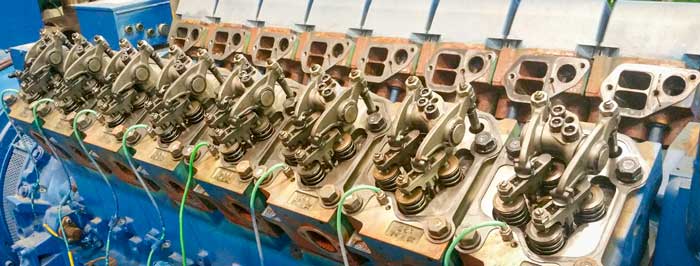
By definition, preventive maintenance is a type of intervention linked to the number of hours the engine is running. This interval of hours is always scheduled by the engine manufacturer. Therefore, this establishes the periodicity in which we must perform preventive maintenance on the engine in order to try to avoid failures. Within preventive maintenance, we can distinguish between minor preventive maintenance or major preventive maintenance, also called Overhaul. The work that must be carried out in each maintenance, as well as the running hours, are always scheduled by the manufacturer in its maintenance plan.
Types of preventive maintenances in industrial engines (gas and diesel)
Preventive maintenance reduces the possibility of unexpected stops. So much so that even the lifespan the engine is benefited, resulting in lower costs in the medium-long term.
At RS Motor we usually divide preventive maintenance into three categories:
Minor Preventive Maintenance: Basic maintenance tasks are performed such as replacing oil filters, renewing air filters, adjusting valve clearance, replacing spark plug washers, replacing rocker arm cover gaskets, and other minor parts. Usually, the execution time of minor preventive maintenances does not exceed four or five hours.
Medium preventive maintenance: In addition to the works previously described, in this case the spare parts of the upper part of the engine are reconditioned, such as, for example, intercoolers and cylinder heads. Depending on the size of the engine, a medium preventive maintenance takes around 4-7 days of execution between stop and commissioning.
Major preventive maintenance (Overhaul): On the basis that an Overhaul is a complete maintenance of the engine, in which all its wear parts are renewed both in its upper part and in its lower part, RS Motor on certain occasions has the ability to adapt to the conditions that end customers may have. Overhaul can be carried out at RS Motor’s facilities or at the customer’s power plant. Sometimes, if the delivery time is a limiting factor, there is the possibility of supplying an exchange “shortblock”, an exchange “longblock” or a complete engine previously assembled at RS Motor and with the Overhaul previously performed.
Advantages of preventive maintenance
The advantages of a good preventive maintenance are more than the disadvantages. Next, we will highlight the most important ones:
- Plant stop forecast: This allows the client to know when the plant will stop and for how long, being able as a consequence to make its internal planning and adapt its needs moments prior to the intervention.
- Fewer unforeseen events: Unscheduled engine stops are considerably reduced since, during preventive maintenance, it is much better to see if the engine has a fault that must be corrected by taking advantage of this stop.
- Longer useful life of the engine: Preventive maintenance avoids and protects the engine in the long term, resulting in a longer useful life.
- Long-term costs are lower: By reducing unscheduled downtime and increasing the useful life of the engine, the long-term investments will be lower and, as a consequence, the end customer will have the engine available for longer.
Preventive maintenance service on gas and diesel engines
After several years of experience, RS Motor is one of the few companies in the world that can offer you both spare parts and service to carry out preventive maintenance of the engine, whatever the country. Hundreds of customers already trust RS Motor when they need to carry out a preventive maintenance on their engine.
The most common maintenance intervals are different from one engine brand to another one, but RS Motor has enough information to know what to do for each type of maintenance regardless of the brand of the engine you have. Our main specialty are the DEUTZ/MWM (CAT), Jenbacher and Guascor engines, although we can also perform this type of maintenance on industrial engines from other brands.
